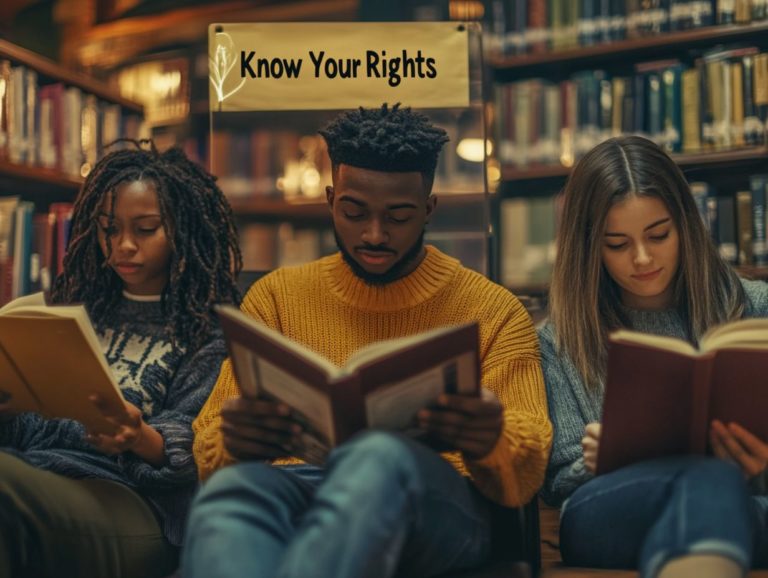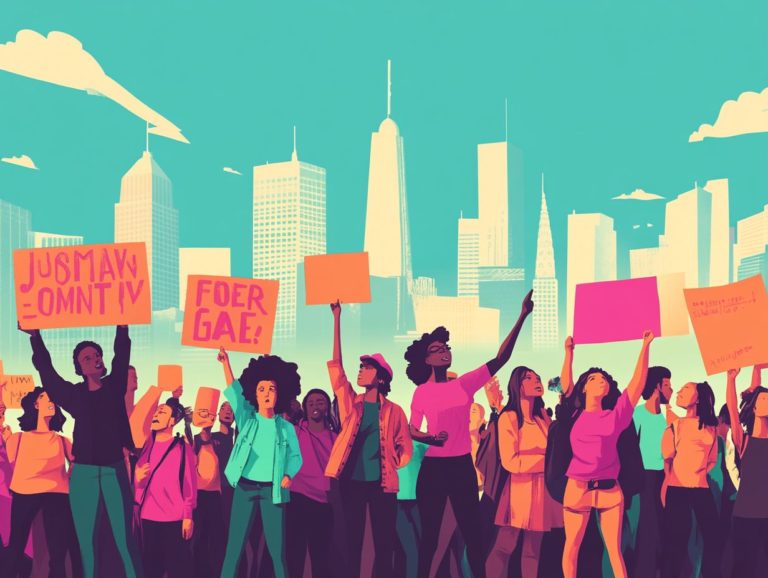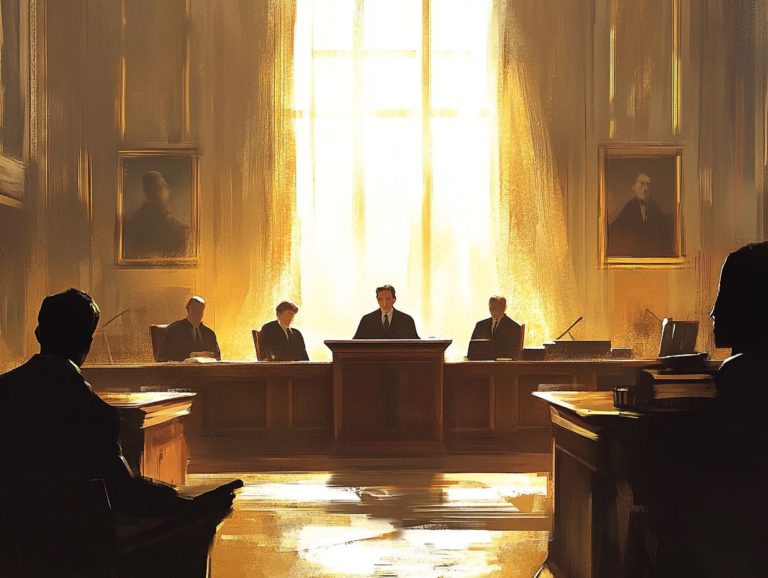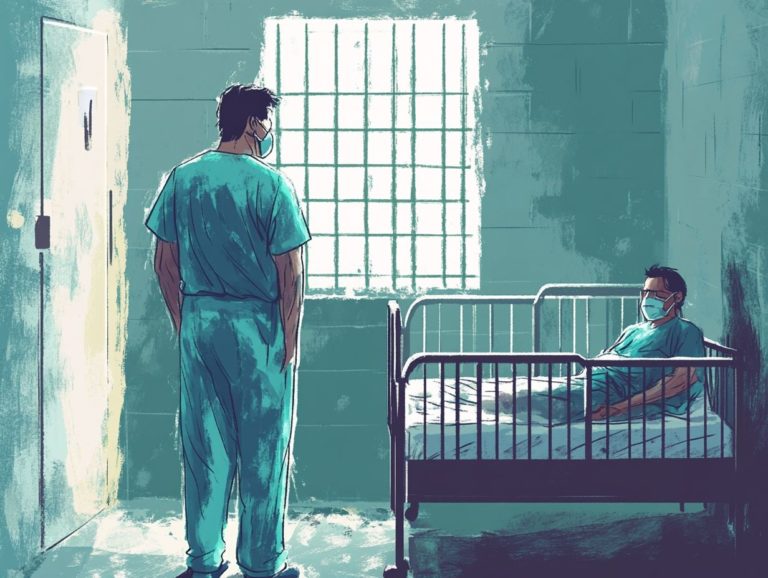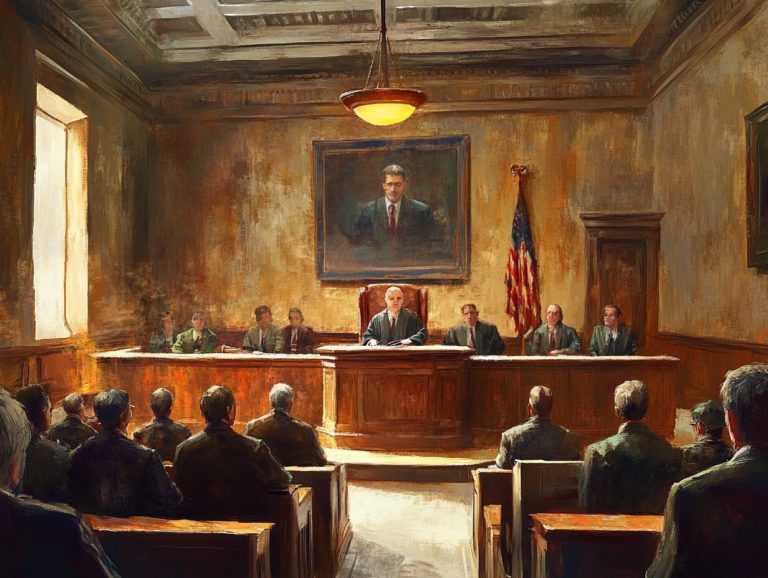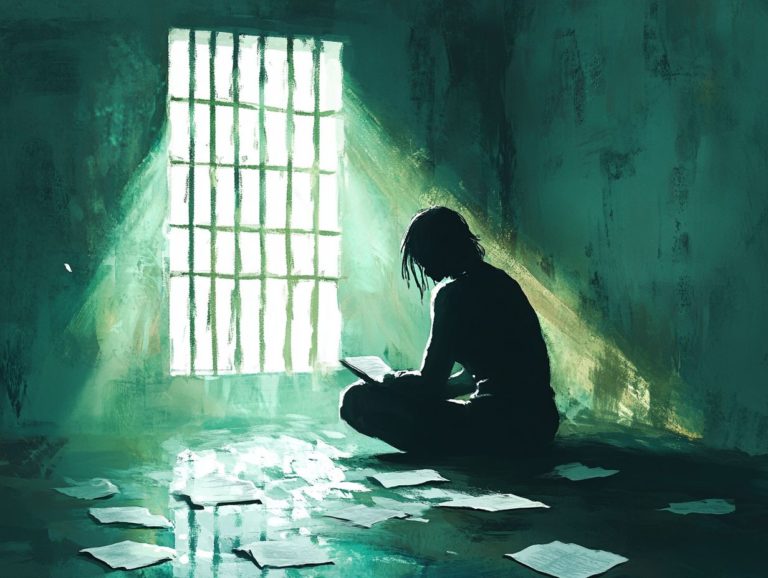5 Essential Rights You Should Know
Human rights serve as the foundation of a just society, ensuring that you, as an individual, are treated with the dignity and respect you deserve.
This article delves into five essential rights that are fundamental to your existence: the right to life and security, equality before the law, freedom of thought and religion, the right to a fair trial, and the right to privacy.
You will explore the broader implications of human rights, how they are safeguarded, their limitations, and the crucial role individuals play in championing these indispensable freedoms.
Dive in and discover the significance of these rights and their profound impact on your everyday life.
Contents
- Key Takeaways:
- 1. The Right to Life, Liberty, and Security of Person
- 2. The Right to Equality Before the Law
- 3. The Right to Freedom of Thought, Conscience, and Religion
- 4. The Right to Fair and Public Trial
- 5. The Right to Privacy and Protection from Arbitrary Interference
- What Are Human Rights and Why Are They Important?
Key Takeaways:
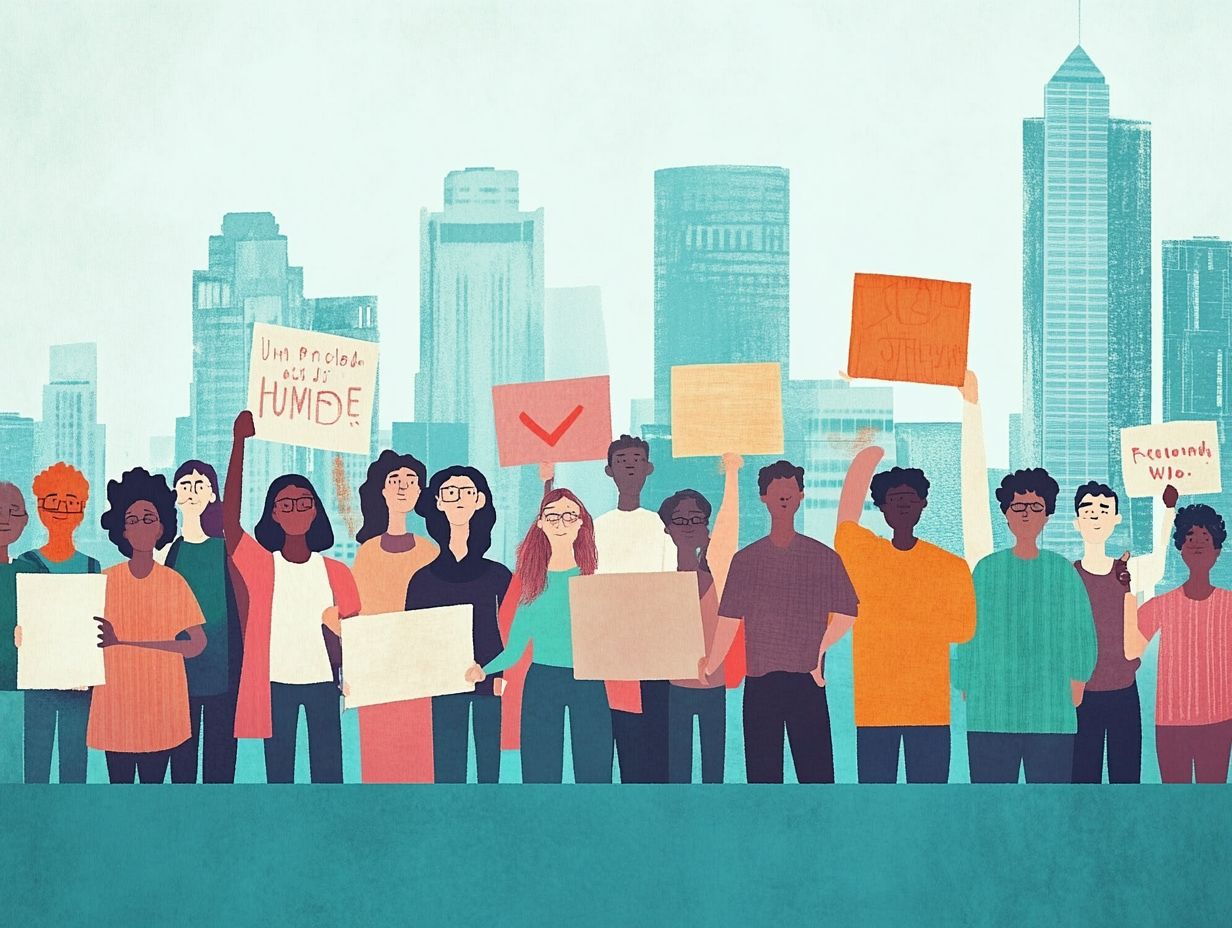
Every person has an undeniable right to live freely and securely!
Equality before the law means that everyone should be treated fairly and without discrimination, regardless of their race, gender, religion, or other factors.
The right to freedom of thought, conscience, and religion allows individuals to hold and express their own beliefs and opinions without being persecuted.
1. The Right to Life, Liberty, and Security of Person
The Right to Life, Liberty, and Security of Person is not just a lofty ideal; it is a cornerstone of your rights enshrined in the U.S. Constitution. This fundamental human right guarantees you protection against unlawful actions, allowing you to live without discrimination and with the dignity you deserve.
This right includes important civil rights, such as your ability to seek legal assistance and fair treatment under the law when faced with actions that might jeopardize your personal freedom. Historically, this right has played a crucial role in landmark cases like Roe v. Wade, which addressed women s rights to choose, and Brown v. Board of Education, which fought school segregation, significantly shaping the legal landscape to promote equality and justice.
For marginalized communities such as racial minorities and the LGBTQ+ population this right often faces significant challenges in enforcement. By acknowledging the intrinsic value of life and security for everyone, society can cultivate an environment where you and others can engage fully and freely, without the shadow of oppression.
In doing so, we reinforce the broader civil rights movement and empower individuals to advocate for their own liberties.
2. The Right to Equality Before the Law
The Right to Equality Before the Law guarantees that you are treated on par with every other individual, irrespective of your background, and offers you protection against discrimination at both federal and state levels.
This principle is a crucial part of our legal system and gained significant momentum with the Civil Rights Act of 1964, which outlawed discrimination based on race, color, religion, sex, or national origin.
Beyond its historical significance, this landmark legislation continues to fuel advocacy efforts, particularly for racial minorities who have endured systemic inequalities for generations.
The act also protects the LGBTQ community, shaping their rights under civil laws. The inclusion of individuals with disabilities in this dialogue illustrates how this right impacts various layers of society, ensuring that all citizens enjoy equal protection and opportunities under the law.
Stand up for your rights and those of others every action counts!
3. The Right to Freedom of Thought, Conscience, and Religion
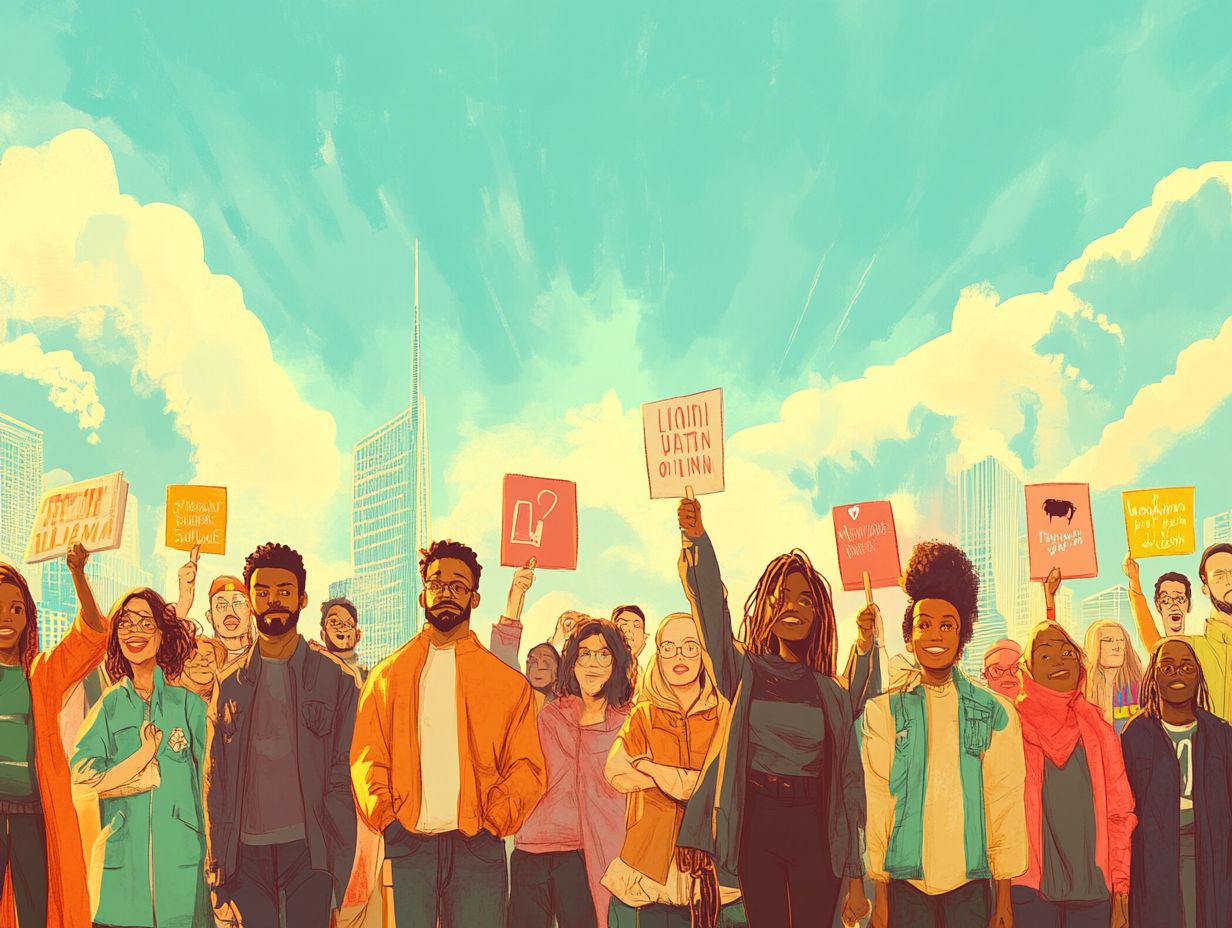
The Right to Freedom of Thought, Conscience, and Religion, enshrined in the First Amendment of the U.S. Constitution, gives you the power to hold your personal beliefs without fear of discrimination or persecution.
This essential liberty has deep historical roots. It reflects the struggles groups faced to practice their beliefs freely in America.
For many religious communities, this right sanctifies their spiritual practices. It also serves as a protective barrier against societal prejudice and governmental overreach.
Its significance extends beyond religious affiliations, impacting non-religious individuals seeking acceptance for their views. The intersection of this right with other civil liberties, especially within educational and community contexts, emphasizes the need for an inclusive environment where diverse perspectives can coexist harmoniously.
As society evolves, your commitment to this right is crucial to protecting freedom for everyone.
4. The Right to Fair and Public Trial
The Right to Fair and Public Trial, enshrined in the Fifth Amendment, stands as a cornerstone of the American legal system. It guarantees that you receive due process and access to legal counsel if you face criminal charges.
This fundamental right is upheld through mechanisms like juries, which bring community perspectives into verdicts. You cannot overlook the significance of the Miranda warning, as it informs you of your rights, protecting you from self-incrimination and ensuring you’re aware of your ability to seek legal advice.
When these rights are violated, the repercussions can be profound, resulting in overturned verdicts, retrials, or even the dismissal of charges. This highlights how crucial it is to follow due process in the justice system.
5. The Right to Privacy and Protection from Arbitrary Interference
The Fourth Amendment safeguards your right to privacy and protection from arbitrary interference. It ensures that law enforcement cannot conduct unreasonable searches and seizures against you.
Over time, this fundamental right has evolved through landmark Supreme Court cases that have shaped its scope and significance in American society. Noteworthy decisions, like Katz v. United States and Roe v. Wade, have reinforced your rights against intrusive government actions.
Privacy encompasses more than just physical space; it extends deeply into personal autonomy. As society confronts challenges like terrorism and cybercrime, a persistent tension emerges between public safety and individual freedoms.
Law enforcement practices often shift in response to these dynamics, prompting critical questions about how far authorities can go in their quest for security without encroaching on the rights that the Constitution seeks to uphold.
What Are Human Rights and Why Are They Important?
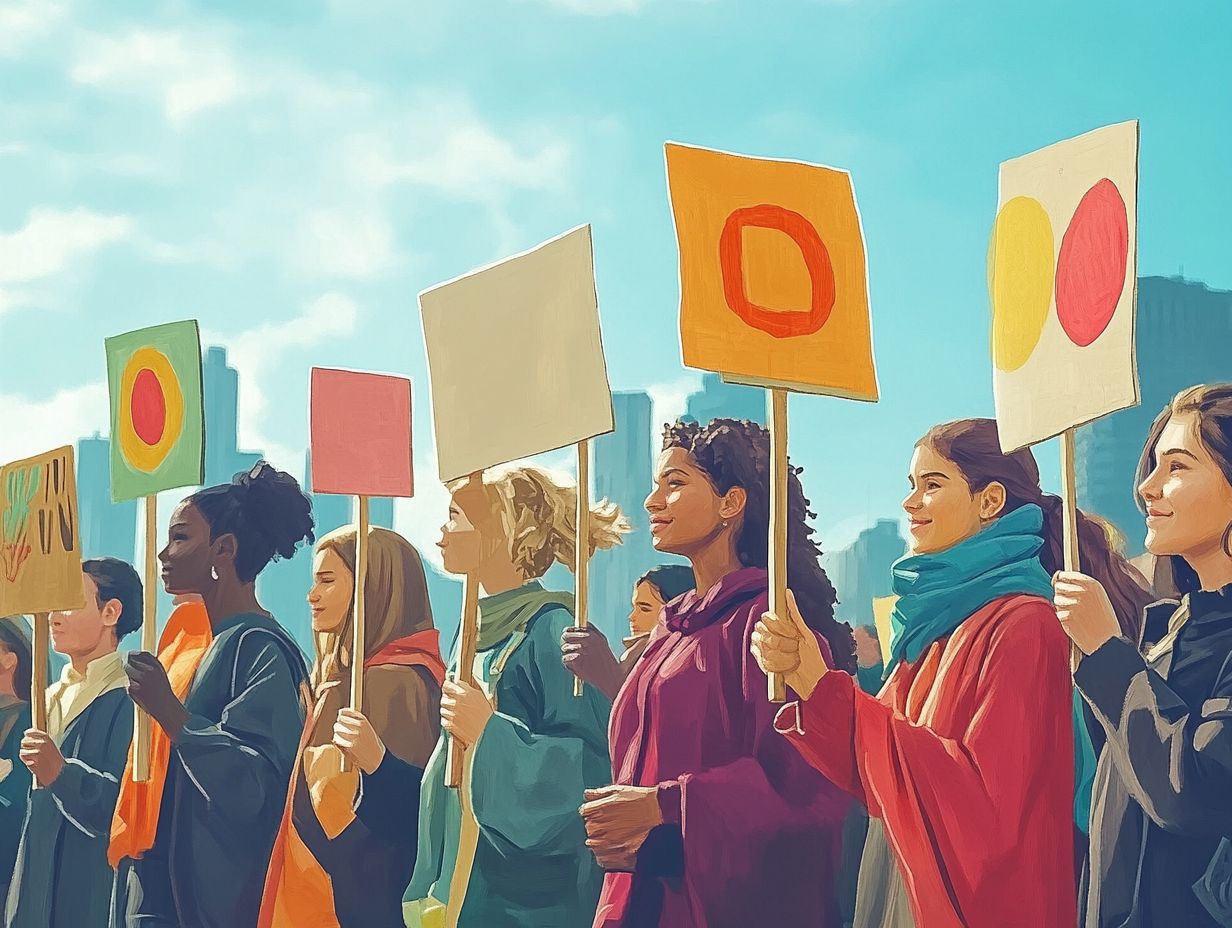
Human rights are the fundamental rights and freedoms that belong to every individual. They encompass civil liberties, legal protections, and the intrinsic human dignity that must be upheld in every society. These rights are vital for fostering equality and justice.
Throughout history, these rights have evolved significantly, shaped by a tapestry of philosophical, cultural, and political movements that inform our modern understanding. The U.S. Constitution plays a pivotal role in this evolution, embedding essential liberties that protect you from government overreach and promote fair treatment.
Landmark amendments and documents, like the Bill of Rights, not only codified these principles but also established a legal framework designed to combat discrimination. This foundational framework is crucial for ensuring social justice, giving power to marginalized groups to advocate for their rights.
Ultimately, it works toward an equitable society where everyone is treated with dignity and respect.
What Are the Different Types of Human Rights?
Human rights fall into several categories: civil, political, economic, and social rights. Each type addresses different aspects of human dignity and societal needs.
Civil rights protect you from discrimination and uphold your freedoms. They empower you to engage fully in society.
Political rights let you vote and run for office. These rights are vital, especially for marginalized groups.
Economic rights include your right to work and earn fair wages. This is especially important for immigrants who may face unfair treatment.
Social rights ensure you can access essential services like healthcare and education. This is crucial for individuals with disabilities needing specialized support.
Understanding how these rights intersect highlights the urgent need for inclusive policies. Everyone deserves dignity and respect.
How Are Human Rights Protected and Enforced?
The protection and enforcement of human rights depend on a blend of legal safeguards, federal legislation, and a network of civil rights organizations committed to defending these rights against violations.
These entities operate within established frameworks created by international treaties, like the Universal Declaration of Human Rights and the International Covenant on Civil and Political Rights. These treaties set the standard for member nations.
Federal laws such as the Civil Rights Act and the Americans with Disabilities Act provide clear legal pathways for individuals confronting discrimination and injustices.
Various non-governmental organizations (NGOs) and advocacy groups also play a vital role in monitoring compliance and raising awareness. They hold violators accountable.
These organizations engage in grassroots campaigns and provide essential support to those affected. Their work strengthens human rights obligations on both national and international stages.
What Are the Limitations of Human Rights?
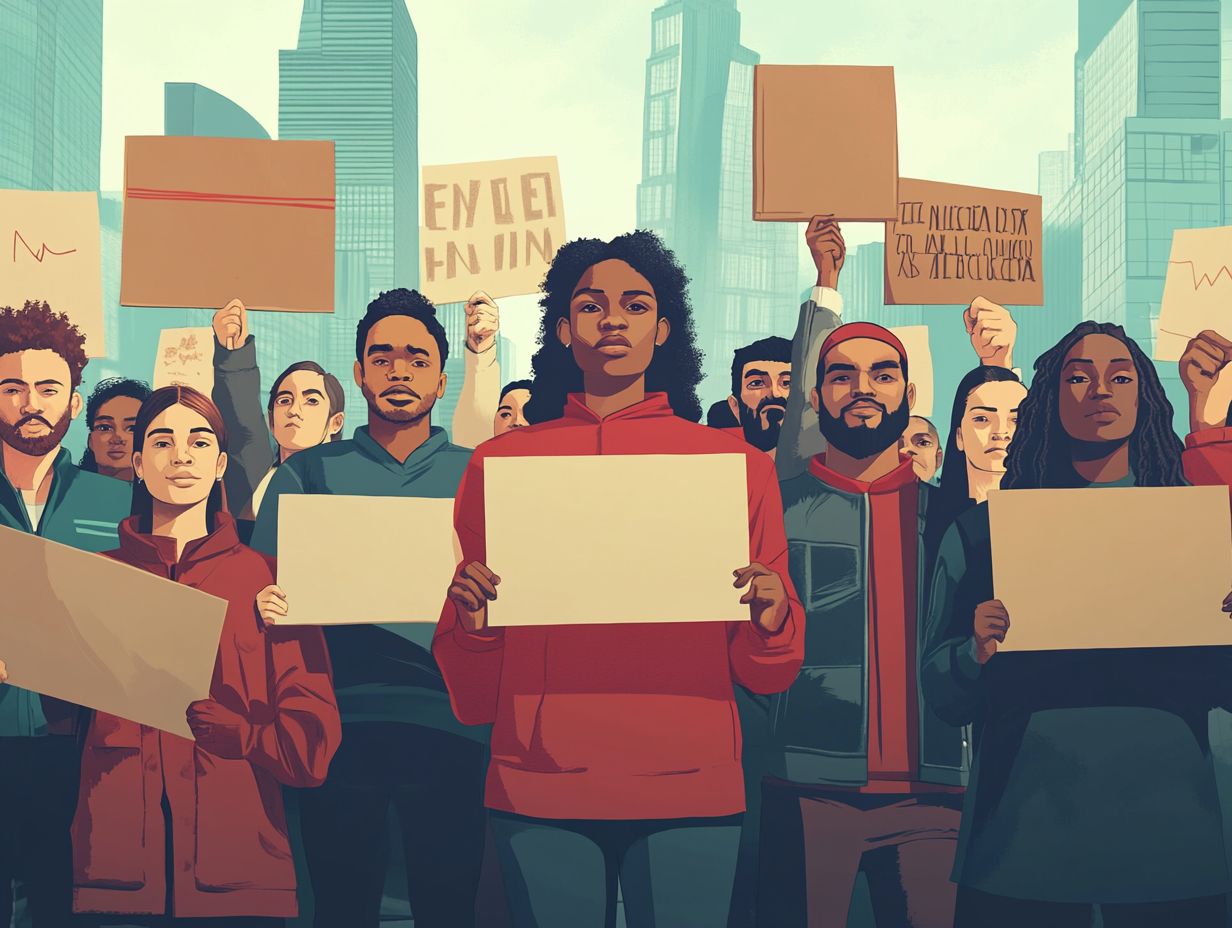
While human rights are fundamental, they aren’t without limits, especially concerning public safety or national security. This reality can sometimes lead to rights violations.
This concept raises important questions about how to strike a balance between societal safety and individual liberties. Legal precedents established by courts often highlight the challenges involved; for instance, rulings concerning freedom of expression typically weigh the right to voice opinions against the risk of inciting violence.
Communities facing such limitations may encounter unjust restrictions that disproportionately impact marginalized groups. This makes it harder for them to access essential services and fosters an atmosphere of distrust.
The discussion around limitations on human rights is not merely theoretical; it has tangible consequences that can influence the very fabric of society.
What Are the Consequences of Violating Human Rights?
Violating human rights can bring about serious consequences, not just for individuals and institutions facing legal repercussions, but also for society at large, leading to heightened discrimination and unrest.
Consider the case of police brutality. It often results in criminal charges against those responsible, alongside civil lawsuits filed by victims seeking justice. Such violations erode trust within communities, intensifying tensions and sparking protests that call for accountability and reform.
When systemic injustices take root, they create a cycle of marginalization that weakens society’s fabric. This underscores the necessity for legal systems to act decisively.
Accountability is essential in upholding civil rights protections. It nurtures an environment where everyone can thrive free from fear and discrimination.
How Can Individuals Advocate for Human Rights?
Take action! Advocate for human rights through community service and by joining civil rights organizations. Seek legal advice to address rights violations effectively.
Enhance your impact by becoming an active participant in community initiatives that focus on specific issues. Whether you support marginalized communities or champion policy changes, your involvement matters.
Participate in campaigns to amplify your voice and connect with like-minded individuals who share your vision.
Utilize platforms like Twitter and Instagram to spread awareness and educate others about pressing human rights issues. This fosters broader conversations and inspires collective action.
By taking these steps today, you help build a fairer society for everyone!
Frequently Asked Questions
Here are some common questions about essential human rights:
What are the 5 essential rights that everyone should know?
The 5 essential rights that everyone should know are:
- The right to life
- Liberty
- Security
- Equality
- Freedom of expression
Why is it important to be aware of these 5 essential rights?
Being aware of these rights ensures that you know your fundamental human rights and can stand up for yourself and others when they are violated.
Can these 5 essential rights be taken away?
No, these rights are universal and inalienable, meaning they cannot be taken away from anyone under any circumstances.
Are these 5 essential rights the same in every country?
While recognized as universal, the interpretation and protection of these rights may vary in different countries.
What should I do if I feel that my rights are being violated?
If you feel your rights are being violated, seek help from a trusted authority or organization that specializes in protecting human rights.
Can I exercise these 5 essential rights even if I am a minor?
Yes, these rights apply to everyone, regardless of age, gender, race, or nationality. As long as you are a human being, you are entitled to these rights.

